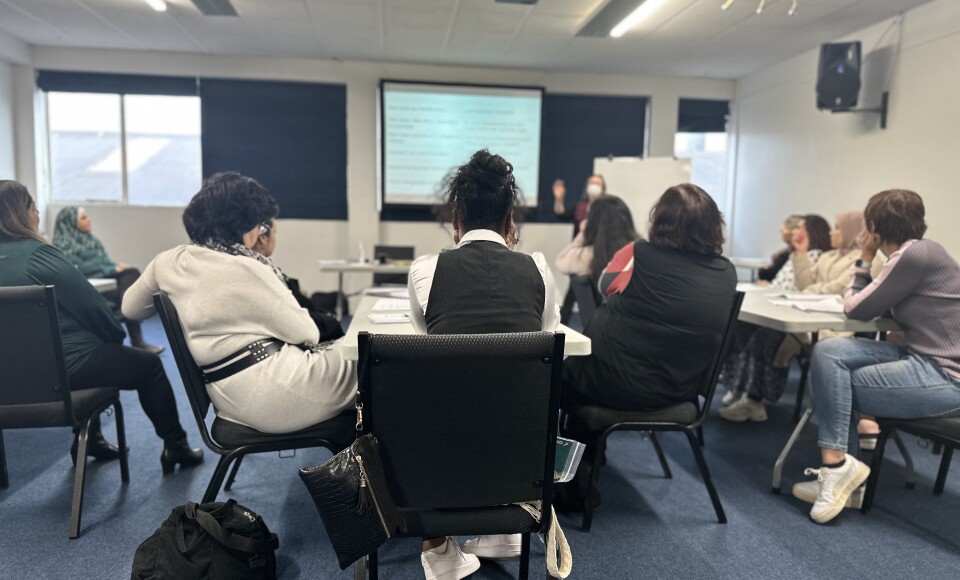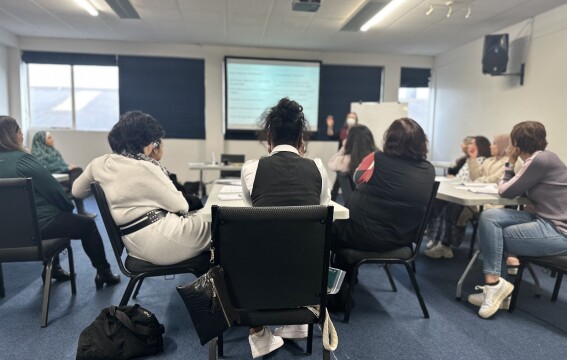From student to teacher – Te Tiriti o Waitangi in our own language
11 September 2024


Our employees work with former refugees to provide safe passage and act as navigators. In their work, they build bridges so that former refugees feel connected to and at home in Aotearoa. They first go over the bridge themselves and then take their clients as part of their own journeys.
In June, we brought these teams together so they could do core training, which covered how to provide Te Tiriti o Waitangi training and support people while working in an Aotearoa context. This way, our people can effectively build bridges and support diverse groups of people on their settlement journeys.
“The aim of the training was so that people who are part of the communities we settle, who speak the languages, can bring the education and learning to their communities,” said Christelle Burger, Director of Migration Settlement at Red Cross.
The core training was provided to our employees who work with former refugees, which includes employment support staff, youth workers, and case workers – who work in areas very similar to social work. We also employ registered social workers as part of our refugee settlement services.
“A lot of us are social workers, so we need to know this stuff,” said Rachel Kidd, a registered social worker and Senior Migration Advisor at Red Cross. Registered social workers must maintain their qualifications and are required to do 20 hours of development each year that focuses on:
- working with Māori, and
- two of the 10 Core Competence Standards for social workers.
The training covered the history of colonisation in Aotearoa, the versions of Te Tiriti and the Treaty, tikanga Māori, and how to find openings to bring other cultures into tikanga Māori. This includes small things, like using a prayer in someone’s own language when a karakia is called for. The aim is to see that though we have many differences, we also have similarities.
Refugee settlement employees are now able to provide this type of training to the people we support and others, who come from refugee backgrounds and speak English as an additional language.
Yibeth Morales Ayala, one of our youth workers, was 14 when her whānau came to Aotearoa under the refugee quota programme. Originally from Colombia, she’s now based in Wellington. She works one-on-one to support former refugee rangatahi in their settlement, offers mentorship and advice, as well as orientation and activity days twice each school term.
“As a youth worker — and for my teammates who were there on the training — not only are you building up all the tools that you need to work in a multicultural country, but this training also gives you the base knowledge of what you’re dealing with when you work in Aotearoa. Where Māori people are still able to stand for their own rights and talk and advocate for themselves – and they have a voice,” she said.
Working with former refugee rangatahi
Former refugee rangatahi often take on a type of pou ārahi | guidepost role from a very young age – they become a source of support for adults because they have the language skills. This means that they carry enormous responsibility in their whānau, where they act as interpreters and advocates for their parents as well as their siblings and cousins.
While they’re pou ārahi for their whānau, they encounter an education system which doesn’t always recognise their experiences or understand them as young people who’ve had to grow up fast. “Our young people come to us and say, ‘I don’t want to go to school because I get treated like I’m stupid and I’m a kid, but no – I’m an adult.’”
This is why orientation and activity days are so important. The events focus on the fun side of things, where they can be kids, and focus on having fun with people who are like them.
“You can see how uncomfortable they are in their everyday lives by how free they are at our activities. They all feel like they can relate to each other. I’ve never seen former refugee children or teenagers feel that comfortable with themselves other than in spaces for former refugees.”
Teaching Te Tiriti o Waitangi to former refugees
School isn’t always going to be a space where refugee rangatahi feel safe to learn. That’s where Yibeth’s facilitator training comes in.
Through learning about Te Tiriti o Waitangi, she’s been able to see the similarities between the experiences she and others have as refugees, and the experiences of Māori.
Learning about Te Tiriti o Waitangi is a powerful experience for people who’ve experienced and survived persecution. It helps former refugee rangatahi find people and role models who are like themselves in a new place.
“By teaching young people where Māori people fit in — that this is their land, this is their culture, and te reo Māori is the first language — it teaches them to embrace their own culture and to be able to relate to someone. It destroys internalised racism.”
Our Movement is guided by seven Fundamental principles:
- Humanity | Te Ngākau Atawhai
- Impartiality | Te Tōkeketanga
- Neutrality | Te Whakaraupapa
- Independence | Te Tū Motuhake
- Voluntary Service | He Ratonga Tūao
- Unity | Te Kotahitanga, and
- Universality | O te Ao.
Our Fundamental Principles are consistent with celebrating and honouring te reo Maori as one of the official languages of Aotearoa.
We recognise that engagement with Māori is essential to our work. We’re committed to using Te Tiriti o Waitangi to guide our relationship with Māori as tangata whenua. We embrace the Treaty principles of partnership, participation, and protection.
More information
- Find out more about our Fundamental Principles and how they guide our work.
Our Fundamental Principles - Our employees support the work of our thousands of members and volunteers. Our career opportunities are as varied as our work.
Work for us - Becoming a refugee support volunteer, our refugee support volunteers are extraordinary community helpers who welcome new Kiwi.
Refugee support volunteer information - Ngā Paerewa Kaiakatanga Matua | Core Competence Standards for social workers reflect practice standards accepted in social work in Aotearoa. Registered social workers are required to meet these standards to practise.
Ngā Paerewa Kaiakatanga Matua information
